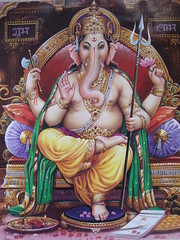Sunday, February 21, 2010
Why do we need God?
Setting aside the cosmological explanation, the concept of a personal God must answer some deep psychological need or needs that humans have, as it has been part of all cultures and societies throughout history. Neanderthals are not even the same species as us, yet flowers have been found in their graves suggesting some kind of ritual associated with death. Some people would say that this alone proves that a God of some kind exists but wide acceptance of an idea does not prove that it is true. What it says to me is that we humans have a longing for what we lack. As we know we are finite beings, we long for the infinite. As we know our lives are brief, we long for the eternal and as we know things only relatively, we long for the absolute. Infinite, eternal and absolute are words often used to define God across all religions.
But there can also be a longing for a more personal relationship. Andre Comte-Sponville says, “What do we wish for more than anything else? Leaving aside our base or vulgar desires, which have no need of God to be fulfilled, what we wish for most is: first, not to die, at least not completely, not irreversibly; second, to be reunited with the loved ones we have lost; third, for justice and peace to triumph; and finally and perhaps most importantly, to be loved.”
Freud of course went further and claimed that humans, when faced with the perils of life and frustrated by their helplessness, recalled memories of the protection afforded them by the father whom they both loved and feared in childhood and constructed a far mightier figure to protect them through the rest of their life and after death. While not totalling agreeing with Freud and what he called the universal neurosis, I do accept some of his arguments that humans made God to satisfy a range of unfulfilled needs and anxieties. My problem with Freud however, is that he is good at analysing the symptoms but not so helpful about offering a cure. He basically says we have to all grow up, stand on our own two feet and accept reality. Easier said than done!
I think we all have to find ways to cope with life and death – it is not necessarily a weakness or a neurosis, it is just human. We Atheists too no doubt have our own God substitutes and need to accept uncertainty. Much as I admire Richard Dawkins, like any fundamentalist he can be at times too certain of his beliefs. There is a freedom though, I think, in realising that we can depend only on ourselves and the people we love to help us through life. Maybe we would fight more to improve things in this life if we withdrew all expectations from the afterlife?
Even though their views on life after death and God are different to mine, I find that some religious figures are helpful as guides for this world. For instance, I respect Jesus for his teachings about humanity and for his emphasis on love, compassion and tolerance. It is not always easy to live in accordance with those values (tolerance is particularly difficult I find) but at least we can try. At its best, belief in God can promote the elevation of those values over things such as power, wealth and bodily pleasure. This is obviously not a bad thing but in my opinion it is not exclusive to a belief in God and can also be achieved with the use of reason and an understanding of human nature.
[The future of an Illusion by Sigmund Freud (Penguin books Great Ideas, London 2004) and again the Book of Atheist Spirituality by Andre Comte-Sponville were used in this post]
Tuesday, February 16, 2010
Spirituality
Just because I don’t believe in an immortal soul does not mean I am without a desire for a meaningful or spiritual existence. Many people think that spirituality is confined to religion but I think they are not synonymous. I define spirituality as a longing to look beyond the self and feel at one with the universe. I suppose it is all in the mind and no doubt there is a perfectly good evolutionary reason for why we feel this way. Whatever the reason, I think there are many ways to be spiritual. I think you can achieve it through any activity that absorbs you completely. Some people find it through observation of nature, through meditation, through music or through art.
I most often achieve this by looking at the stars. I find the infinite and eternal nature of the night sky incredibly soothing. All my worries, anxieties and irritations fall away into insignificance and I realize that nothing really matters as I am a tiny finite speck in the universe, yet nevertheless I still am a part of it. It contains me yet it is indifferent to me and for some inexplicable reason that makes me feel peaceful and happy rather than scared or alone.
I have also found meditation very beneficial and sometimes I can achieve a similar feeling to star-gazing through just clearing my mind and listening to the silence. It kind of feels like the barrier between the body and the world has disappeared and you are just floating openness. Apparently it is called the oceanic feeling. It is very strange but not unpleasant and on one or two occasions I swear I have felt bliss. I know it must just be some chemical reaction but whatever causes it, it is good! I think that is why Eastern religions or philosophies can be appealing as you learn to look inward for your own salvation or enlightenment.
But at other times I think spirituality is whatever makes you feel really alive. It is when time appears to stand still or no longer matters. You can feel it sometimes when transfixed by a painting from another place and time or when reading books written long ago that resonate with you and you realize that despite everything it is good to belong to the human race. I know there is much we can change or improve about our world but I feel gratitude for life rather than despair. I agree with Andre Comte-Sponville when he says “Why dream about Paradise? The Kingdom is here and now.”
[The Book of Atheist Spirituality, Bantam Press, Great Britain 2008]
Sunday, February 7, 2010
What is the point of Life?

NASA's Great Observatories Celebrate the International Year of Astronomy
Originally uploaded by NASAJPL
How did everything begin?
What am I here for?
What happens when I die?
These are the ultimate existential questions that confront us when discussing life, religion, philosophy and the universe. For me, the Big Bang theory seems the best answer so far to the first question. The conditions that gave rise to life on earth seem very precise and rather improbable yet along with evolution seem to me to be the most likely explanation of the fact that we are here. What was there before the Big Bang and why it happened at all still seem unanswered but maybe that is due more to the limitations of my understanding rather than to gaps in scientific knowledge.
However, the purpose of the universe and of life on earth has not to my knowledge been answered yet by science. I know physicists are searching for the unifying theory but maybe it will still turn out to be just another mechanistic explanation rather than the reason or purpose for the universe. Personally I am happy to make my own purpose and just accept not knowing or being uncertain of any other, but I do rather like the idea of the giant experiment run by mice as described in the Hitchhiker’s guide to the Galaxy. It is certainly more appealing to me than the idea of God as described in the Bible.
I suppose there is a chance that some creative force was responsible for the Big Bang and everything that has happened since including evolution. Where the force came from is still a mystery, as is its purpose. We can speculate that maybe the purpose was because it could, or because it wanted to see what would happen. Or maybe there was some other purpose that we do not know of yet, or will ever know given our relative unimportance in the scheme of things. You could call this force God if you like but I think it would have to be a different God to the one described in Bible for a number of reasons.
Firstly, it says in the Bible that God created man in his own image and I have a real problem seeing some sort of supernatural human being physically able to create the universe. The force that created the universe by definition must be something quite different to us and we can probably not imagine what it might look like or how it might think. Secondly it does not seem to me that the universe was created for us or that we are at the centre of it as the bible suggests. We are just one species among many on a small planet on the edge of one galaxy among many in the universe. Therefore it is rather arrogant to think that we are the end product of evolution and the reason for it, let alone that this force would have some special attachment to one tribe of our species in a small part of this planet or that it would necessarily want to intervene in any way.
I think that in fact we have created God in our own image for a variety of reasons including the natural human desire to find patterns and the desire for order and certainty in a chaotic world. Perhaps though it is mostly to do with the last question: what happens when we die? That is our greatest fear and maybe the hardest to deal with. I believe that we have to accept death as the end of our life and that there is nothing after death. Many people believe in an after-life where there may be personal consciousness of some kind or even reincarnation. That doesn’t appeal to me particularly but when dealing with the death of people I love, I try to find consolation in philosophy, mythology and spirituality. Spirituality like morality does not have to be confined to religion or a belief in a God as I hope my next post will show!
Subscribe to:
Comments (Atom)



